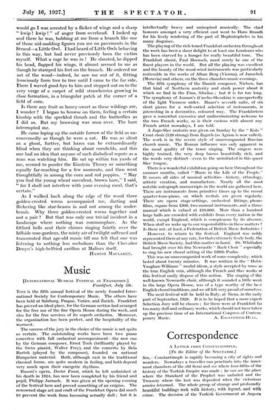Music
[INTERNATIONAL MUSICAL FESTIVAL AT FRANKFORT.]
Frankfort, July 5th.
Tuts is the fifth annual festival of the newly founded Inter- national Society for Contemporary Music. The others have been held at Salzburg, Prague, Venice, and Zurich. Frankfort has proved an ideal place, for the German section had arranged for the free use of the fine Opera House during the week, and also for the free services of its superb orchestra. Moreover, the organization has been perfect, and the hospitality of the warmest.
The success of the jury in the choice of the music is not quite so certain. The outstanding works have been two piano concertos with full orchestral accompaniment—the new one by the German composer, Ernst Toch (brilliantly played by the Swiss pianist, Walter Frey), and the concerto by Bela Bartok (played by the composer), founded on national Hungarian material. Both, although cast in the traditional classical forms, are quite modern in feeling, and both depend very much upon their energetic rhythms.
Busoni's opera, Doctor Faust, which he left unfinished at his death in 1924, has now been completed by his friend and pupil, Philipp Jarnach. It was given at the opening evening of the festival here and proved something of an enigma. The renowned stage art and craft of the Frankfort Opera did much to prevent the 'Work from becoming actually dull ; but it is intellectually heavy and uninspired musically. The chief honours amongst a very efficient cast went to Hans Brandt for his lively rendering of the part of Mephistopheles in his many disguises.
The playing of the rich-toned Frankfort orchestra throughout the week has been a sheer delight to at least one Londoner who has been starved by a hunger for really beautiful tone. The Frankfort oboist, Paul Hoensch, must surely be one of the finest players in the world. But all the playing was excellent and the beauty of the wood-wind instruments was particularly noticeable in the works of Alban Berg (Vienna), of Janachek (Moravia) and others, on the three chamber-music evenings.
The fifth symphony of the Danish composer, Nielsen, has that kind of Northern austerity and stark power about it which we find in the Finn, Sibelius ; but it is far too long. The symphony of Axman's (Czecho-Slovakia) is unexpectedly of the light Viennese order. Hauer's seventh suite, of six short pieces for a well-varied selection of instruments, is interesting in a decorative, coloured way. The Frankforters gave a somewhat excessive and undiscriminating welcome to the two French works, as is their custom with almost any French artist nowadays, I am told.
A Jugo-Slav oratorio was given on Sunday by the " Bolo " Croat choir (120 strong) from Zagreb (as Agram is now called). The work is in the severe style of unaccompanied Russian church music. The Roman influence was only apparent in the nasal quality of the tenor singing. The singers were highly trained, the very deep basses beautifully rich, and the words very distinct—even to the uninitiated in this queer Slav tongue.
There is a wonderful exhibition going on here throughout the summer months, called " Music in the Life of the People." It covers all sides of musical activities—history, ethnology, artistic creation, and manufacture. Nearly all the most notable autograph manuscripts in the world are gathered here. There are instruments from primitive times up to the recent quarter-tone-piano, on which recitals are given regularly. There are opera stage-settings, orchestral fittings, phone- films, organs from £300, two-manual instruments, and a three- manual which is valued at £10,000. More than a hundred large halls are crowded with exhibits from every nation in the world, except England, which is conspicuous by its absence. When shall we wake up to our responsibilities in these matters ? Is there not, at least, a Federation of British Music Industries
However, to return to the festival. England was nobly represented there at any rate, for that extremely lively body, the British Music Society, had this matter in hand. Dr. Whittaker had brought over his fine Newcastle " Bach Choir " especially to sing his new choral setting of the 139th Psalm.
This was an unaccompanied work of some complexity, which lasted about twenty minutes. It was written in the " Hoist- Vaughan-Williams " modal idiom, a style accepted by some as the true English vein, although the French and Slav works at this festival easily dispose of this notion. The singing of this well-known Newcastle choir, although it sounded a little weal; in the large Opera House, was of a type worthy of the best English choral traditions, and we all felt very proud of ourselves.
The next festival will be held in Italy, at Siena, in the early part of September, 1928. It is to be hoped that a more expert Selection Jury will be chosen ; for there were at Frankfort fat too many dull and ordinary works, which should not have taken up the precious time of an International Congress of Contem-










































 Previous page
Previous page